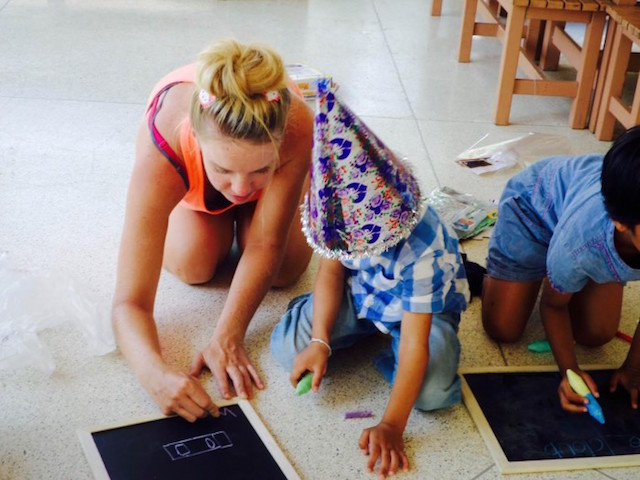
My first impression of a Thai classroom can be summed up with one of the country’s oldest adages: “Same same, but different.”
Before I left the U.S. for Thailand, the pictures I saw of students seemed familiar—little munchkins in uniforms, lined up with backpacks to salute the flag in the morning. Same same, right? But my first day in a Thai classroom clued me in to just how different this educational experience would be for me.
For one, the chaos and frenzy was overwhelming. Nobody had supplies of their own—pencils, erasers, chairs, even desks were shared. As I tried to assist the class, kids were constantly getting up and down, moving desks and leaving the room.
But what looked like a free-for-all to me was just business as usual for the students. They shared everything because there weren’t enough supplies to go around. And while the constant movement confused and distracted me, it was totally routine to the other teachers, and in years since, I’ve learned that the adults do not act any differently. It’s loud, it’s disorganized and it’s “not same same” as a Western classroom.
I couldn’t control the kiddos or comprehend the priorities and flow of a Thai school. But no matter how bad the day was, I also couldn’t pry myself away from that classroom. I had gained such a deep-rooted love for these amazing kids that the contrast between my own educational upbringing and theirs ceased to matter. I was somewhere different now, and it was time to act, think, and therefore teach, differently.
Teaching in an Asian classroom, or any foreign setting, doesn’t require giving up the core of what teaching is, but it does demand letting go of Western roots a little to be successful—or just to stay sane. I can sum up my advice to you in three words: love, learn, and leave. Here’s how how to do it:
1. Love first, teach second. Diving headfirst into a country and setting where your knowledge is limited, at best, isn’t going to spark the kind of bond with students necessary to overcome a language barrier.
Unless you are bilingual or your English students are already fairly fluent, you won’t be able to lead with your knowledge.
Lead with love by sitting with them outside of class, getting to know their families and finding out what makes them happy. This will lay a foundation that makes a deeper learning and understanding possible in the classroom.
2. Learn more than you teach. If you find something isn’t working, the students probably aren’t the problem; it’s likely your approach or misunderstanding of their point of view.
For example, in Thailand there is no translation for the words “yes” and “no,” so if you are phrasing things as yes-or-no questions, your lesson will likely be met with confusion.
To be a good teacher and create more meaningful relationships with your students, you need to turn the tables and soak in their language and cultural climate. Commit yourself to learning just as much as to teaching.
3. Leave if you’re a part of the problem. The purpose of being a foreign teacher is to expose students to experiences and lessons that other teachers can’t. If a local teacher is capable of doing your job, but the school only wants an American person, that’s not right. So speak up, and leave.
If you are in a school run by unmotivated educators and inhabited by students who aren’t interested in learning English, get out of there.
Most Western teachers plan to stay aboard for only a couple of years or less. So if this is you, you need to make your time count by seeking opportunities in which the desire to learn isn’t being met.
There are many pitfalls on both sides to using Western teachers in Thai schools, and I’ve been in my fair share of situations when I felt that I was part of the problem. But if we can stand our ground and move on when necessary, adjust our own ideas, and love constantly, the impact of a Western teacher can be amazing for both parties.
It’s not an easy journey. But if you can do your best to live by the motto “Leave people better than you found them,” I can almost guarantee we’ll be the ones who leave better.
Author: Kathryn Dillman
Image: Author’s Own
Apprentice Editor: Elizabeth Gottwald; Editor: Emily Bartran








Read 0 comments and reply